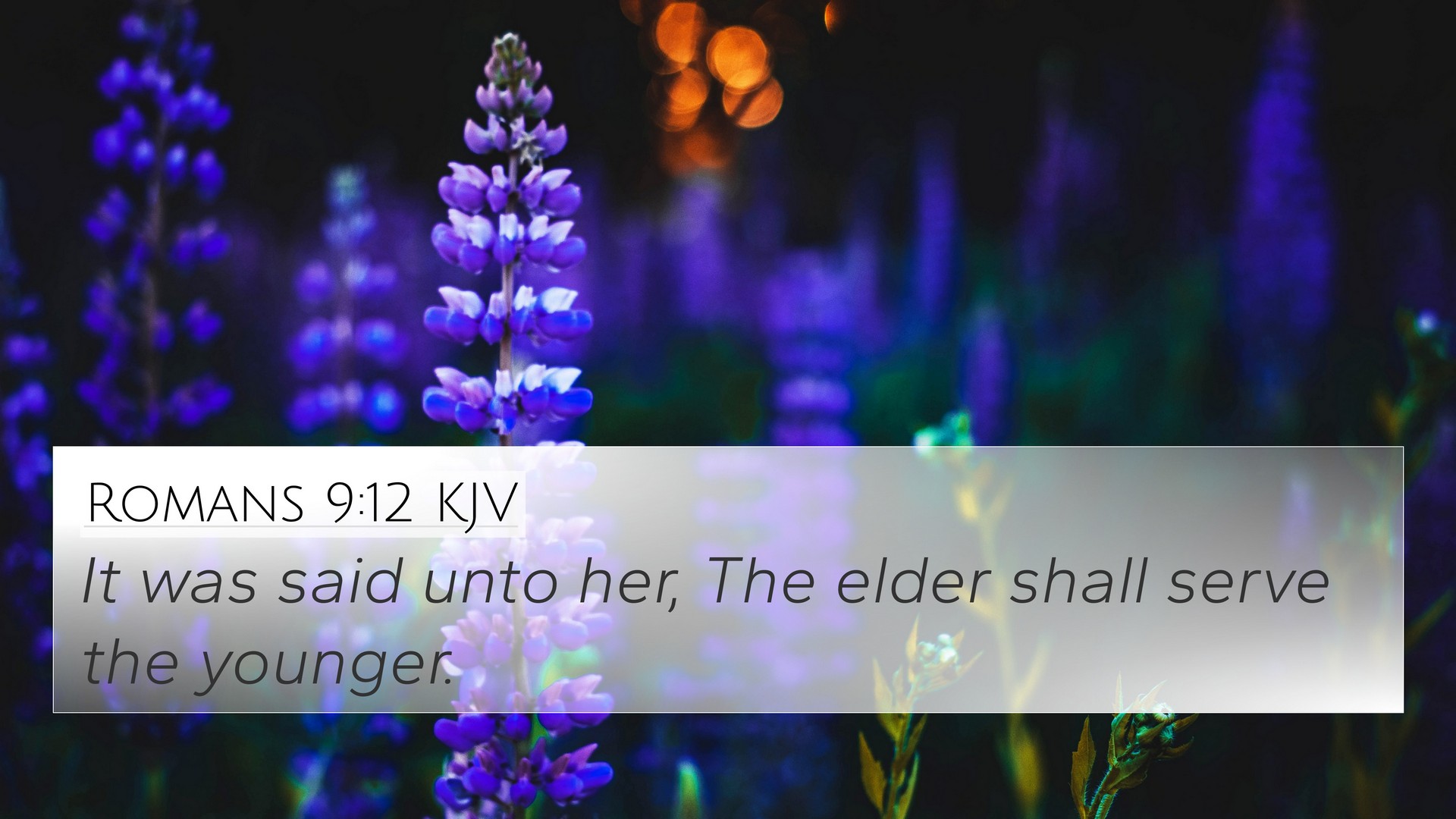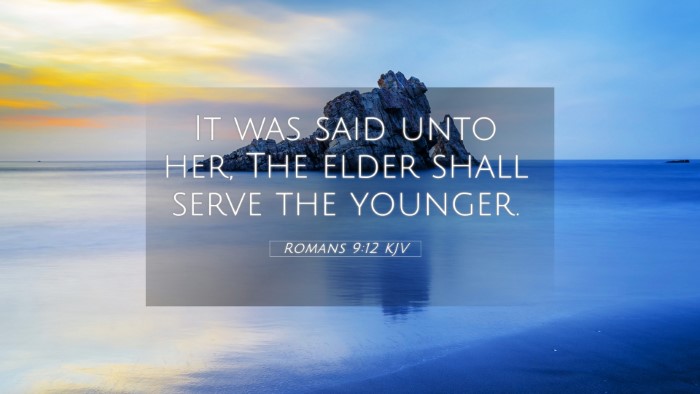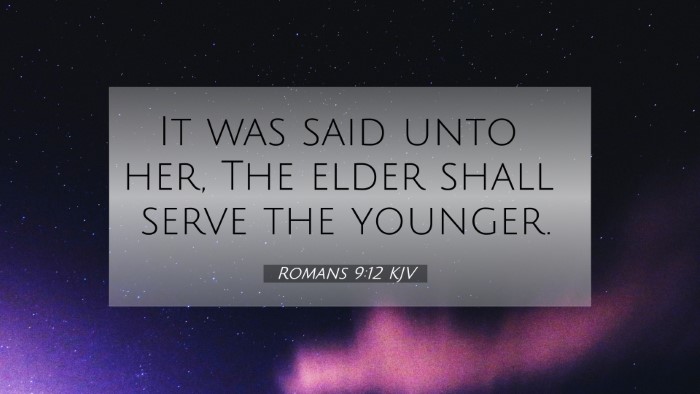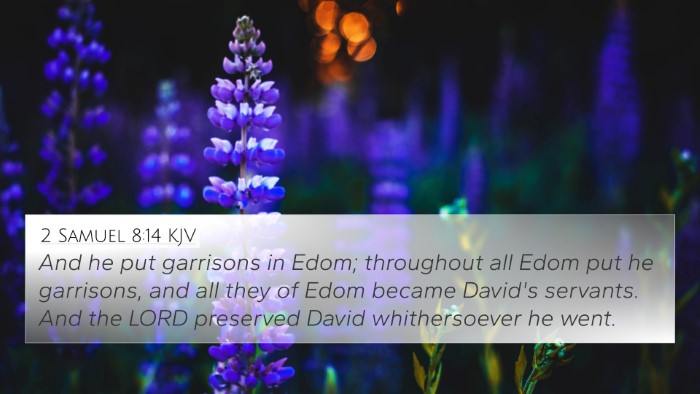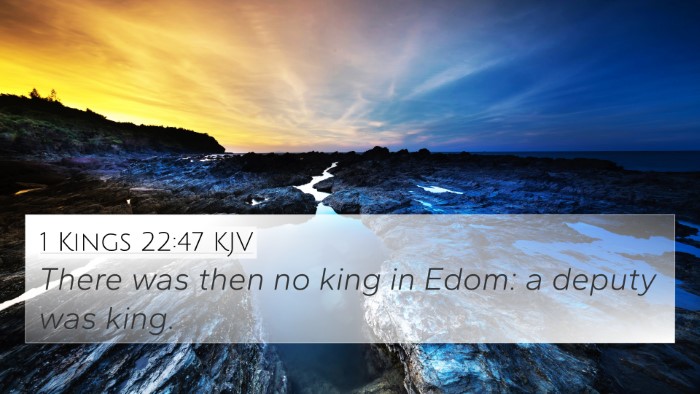Understanding Romans 9:12
Romans 9:12 states: "It was said to her, ‘The older will serve the younger.’"
This verse is a critical part of the Apostle Paul's discourse on divine sovereignty and the concept of election. The context of Romans 9 delves into God’s choice of Israel, the people He has set apart for His purpose, and specifically His choice of individuals within that nation.
Primary Themes
- Divine Sovereignty: The verse exemplifies how God's choices do not adhere to human expectations or societal norms.
- Election: It reflects God's selection of Jacob over Esau, showing that God's grace is not based on works but on His purpose.
- Servanthood: The older serving the younger conveys a reversal of expectations, which is a recurring theme in Scripture.
Commentaries Insights
Matthew Henry's Commentary: Matthew Henry emphasizes the implications of God’s choice between Jacob and Esau. He suggests that this quote underscores the grace of God, highlighting that divine election is not contingent upon human behavior or righteousness.
Albert Barnes' Notes: Barnes points out that the statement reflects an ancient prophecy concerning the relationship between the two brothers. It illustrates that God has the power to alter roles and expectations among individuals, emphasizing His authority over creation.
Adam Clarke's Commentary: Clarke examines the historical context, mentioning that this pronouncement is rooted in God's ultimate plan. He stresses that the prophetic message serves as a reminder of God's overarching control and foreknowledge, asserting that the younger, Jacob, would hold the greater blessing and dominion.
Cross-References for Further Study
- Genesis 25:23: "The LORD said to her, ‘Two nations are in your womb, and two peoples from within you will be separated; one people will be stronger than the other, and the older will serve the younger.’"
- Malachi 1:2-3: "I have loved you, says the LORD. But you say, 'How have you loved us?' Is not Esau Jacob's brother? declares the LORD. Yet I have loved Jacob but Esau I have hated."
- Hebrews 12:16: "See that no one is sexually immoral or unholy like Esau, who sold his birthright for a single meal."
- Romans 9:11: "Though they were not yet born and had done nothing either good or bad—in order that God’s purpose of election might continue, not because of works but because of his call."
- Genesis 27:29: "Let peoples serve you, and nations bow down to you. Be lord over your brothers, and may your mother’s sons bow down to you. Cursed be everyone who curses you, and blessed be everyone who blesses you!"
- Isaiah 54:17: "No weapon formed against you shall prosper, and every tongue that rises against you in judgment you shall condemn. This is the heritage of the servants of the LORD, and their righteousness is from Me, says the LORD."
- Psalm 105:6: "O offspring of Abraham, His servant, children of Jacob, His chosen ones."
Connections Between Bible Verses
To fully appreciate the meaning of Romans 9:12, it is essential to establish connections between various scriptures:
- Thematic Connection: The thematic narrative concerning divine choice is prevalent in the stories of Joseph (Genesis 37) and David (1 Samuel 16), where the least expected becomes the chosen one.
- Comparative Analysis: Romans 9:12 pairs well with Romans 9:16, as both underscore the idea that God's mercy and election lie beyond human effort.
- Inter-Biblical Dialogue: The dialogue across the Testaments shows God's unchanging purpose, as highlighted in both Old and New Testament figures.
Tools for Bible Cross-Referencing
For those studying this verse, utilizing tools for Bible cross-referencing can yield deeper insights. A Bible concordance can help locate related scriptures, while a bible reference guide can provide contextual understanding.
Conclusion
Romans 9:12 serves as a foundational verse illustrating the principles of divine choice and the profound way God orchestrates His plans. Through the lens of cross-referencing, believers can explore similar themes and gain a more holistic understanding of Scripture, enriching their faith and theological knowledge.
By studying the connections between Bible verses such as those listed above, we can appreciate the unity and coherence of God's Word. This cross-referencing works not only for academic purposes but also for personal spiritual growth and sermon preparation.
